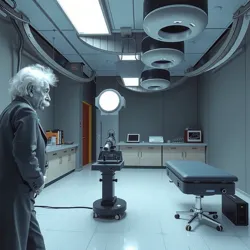Albert Einstein: The Cloned Legacy
In a remarkable intersection of science fiction and reality, a team of pioneering time-traveling scientists has successfully cloned the renowned physicist Albert Einstein. This extraordinary leap, facilitated by cutting-edge temporal technology, has sparked both fascination and controversy in the global scientific community.

The Cloning Breakthrough
The cloning was achieved using the ChronoSphere, a sophisticated device originally designed for non-intrusive observation of historical events. This marks the ChronoSphere's first use in actively altering the timeline, raising significant ethical questions. The Einstein Clone Project aims to harness the intellectual prowess of historical figures to solve contemporary scientific dilemmas, while maintaining ethical boundaries as outlined by the Temporal Ethics Council.
Ethical Considerations
The cloning of Einstein has ignited a fervent debate within the Temporal Ethics Council, a body dedicated to overseeing the moral implications of time manipulation. The central issue revolves around the balance between scientific advancement and ethical responsibility. The council's discussions have emphasized the importance of establishing guidelines to prevent potential misuse of time-travel technology.
Implications for Science
The clone, endowed with the intellectual capabilities of the original Einstein, is anticipated to make significant contributions to modern science, particularly in the field of quantum mechanics. The presence of the clone offers a unique opportunity to revisit and potentially resolve enduring scientific debates, such as those that took place during the 1927 Solvay Conference, where Einstein famously engaged with Niels Bohr.
The Quantum Paradox
Central to the challenges posed by the clone's existence is the Quantum Paradox, a theoretical conundrum that arises from the intertwining of past and present realities. Scientists are actively exploring frameworks to address the paradox, seeking to understand the implications of Einstein's dual presence in history and contemporary times.
The Temporal Laboratory
The creation of Einstein's clone took place in a state-of-the-art temporal laboratory, equipped with advanced technology and meticulously orchestrated procedures. This facility is emblematic of the fusion of traditional scientific methods with groundbreaking innovations in time travel and cloning.
Public Engagement
In response to these developments, a Public Forum on Cloning Ethics has been convened, inviting a diverse array of voices to contribute to the dialogue on the ethical dimensions of cloning historical figures. This forum will play a crucial role in shaping future policies on the application of such transformative technologies.
See Also
- Temporal Mechanics: The Future of Physics: An exploration of the historical advancements in temporal studies that have set the stage for contemporary innovations in time travel and cloning.
- Time Traveling Scientists Clone Einstein: A detailed account of the scientific and ethical journey leading to the successful cloning of Albert Einstein.
- Temporal Ethics Debate Heats Up: An overview of the ongoing discussions within the Temporal Ethics Council regarding the moral implications of timeline interventions.
Through the lens of the Quantum Chronicles: The Einstein Enigma, this article delves into the profound possibilities and challenges posed by the fusion of time travel and cloning, as humanity continues to push the boundaries of scientific knowledge.